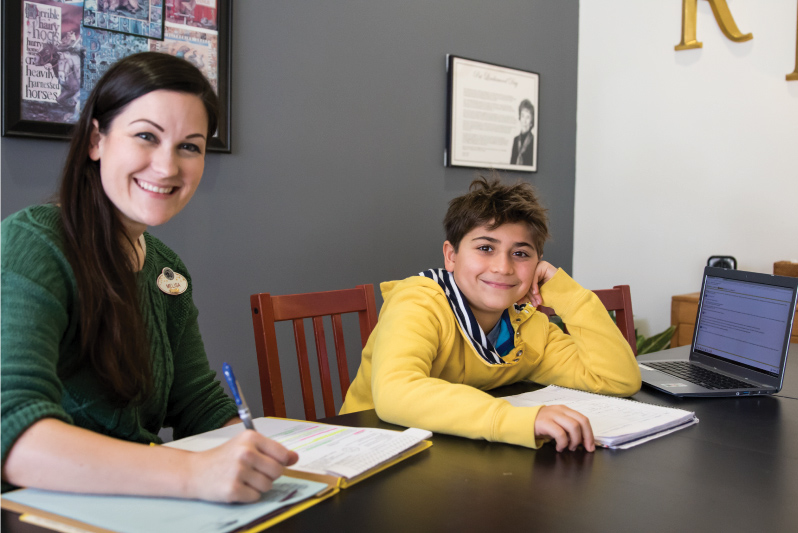Support for Dyslexia and Other Reading Disorders
Understanding the Signs of Reading Disorders and Finding Effective Help

If your child is struggling with reading, you’re not alone, and early support can make all the difference. It’s common for parents to wonder whether their child is just taking longer to catch on, or if something deeper, like dyslexia or another reading disorder, might be at play. At Lindamood-Bell, we specialize in identifying and addressing the root causes of reading difficulties. Our evidence-based instruction helps individuals of all ages and skill levels build the essential foundation for reading success and lasting confidence.
What Is Dyslexia?

Dyslexia is a language-based learning difficulty that affects how the brain processes written and spoken words. Children with dyslexia may have trouble sounding out words, recognizing familiar words automatically, or spelling accurately. These challenges can make reading feel slow, effortful, and frustrating, especially when they impact fluency and comprehension. Importantly, dyslexia is not a reflection of a child’s intelligence or effort. With the right support and targeted instruction, students with dyslexia can become confident, capable readers and spellers.
Signs of Dyslexia

Some of the most common signs that may indicate dyslexia include:
Difficulty with Sounding Out Words and Recognizing Sight Words
Students with dyslexia often have trouble breaking words into individual sounds (phonemes). They might misread words by skipping or substituting letters, for example, reading “steam” instead of “stream.”
They may also struggle to recognize sight words like “eye” or “thought,” which must be memorized and don’t follow typical phonetic rules.
Struggles with Reading Fluency
A student might be able to sound out words correctly but still read slowly or with frequent stops. When reading doesn’t flow smoothly, it becomes harder to understand the overall meaning of a sentence or story.
Ongoing Spelling Challenges
Spelling can be a lasting struggle for children with reading difficulties. They might spell words the way they sound but have trouble remembering the correct spelling, especially for words that don’t follow typical rules.
If these signs sound familiar, it may be time to take a closer look. The sooner you identify the issue and get the right support, the sooner your child can start gaining confidence and skills that will last a lifetime. Explore results from students diagnosed with dyslexia who received Seeing Stars® instruction at our Learning Centers.
Understanding Other Reading Disorders

While dyslexia is one of the most widely recognized reading disorders, it’s not the only one. Other challenges can affect a child’s ability to read effectively, and Lindamood-Bell programs are designed to support a range of learning needs.
Reading Comprehension Difficulties
Some children can read words accurately but still have difficulty understanding what they’ve read. This challenge often stems from weak concept imagery—the ability to create mental pictures from language. Without this imagery, it’s difficult to follow the meaning of sentences, grasp main ideas, and retain important details.
The Visualizing and Verbalizing® program develops this essential skill, helping students build the mental imagery needed for strong comprehension. As concept imagery improves, students can better understand and remember what they read or hear, make inferences, and think critically.
Want to see what’s possible? Explore results from students who received Visualizing and Verbalizing instruction at our Learning Centers.
Central Auditory Processing Disorder (CAPD)
CAPD affects how the brain processes auditory information, making it difficult for a child to distinguish and manipulate sounds, skills that are foundational to reading. This can lead to struggles with phonemic awareness, decoding, and fluency.
At Lindamood-Bell, we address reading challenges like these through intensive, one-to-one instruction that develops the sensory-cognitive skills essential for reading success. The Seeing Stars® program helps students with CAPD strengthen their ability to perceive sounds, decode words, and become more accurate and fluent readers.
Many students diagnosed with CAPD have made significant gains through our approach—see their progress here.
Dysgraphia
Dysgraphia is a learning challenge that primarily affects writing, but it often overlaps with reading difficulties. Children with dysgraphia may have trouble with spelling, organizing their thoughts on paper, using proper grammar or punctuation, or maintaining legible handwriting. These difficulties can make written expression frustrating and time-consuming, and they may affect performance across multiple subjects.
At Lindamood-Bell, we address these interconnected challenges with a comprehensive approach. Our reading instruction—using the Seeing Stars® program for decoding and spelling and the Visualizing and Verbalizing® program for comprehension—helps strengthen the underlying sensory-cognitive skills that are essential for reading and writing success. For example, students who struggle with organizing their thoughts in writing often benefit from Visualizing and Verbalizing, which develops concept imagery and helps them clarify and sequence ideas more effectively.
In addition, our Academic Prep program offers targeted support for students looking to improve higher-level skills such as writing, organization, study skills, and test preparation strategies. With one-to-one instruction and customized goals, students build confidence in their writing and executive functioning abilities, gaining tools they can use in school and beyond.
No matter what type of reading or learning difficulty your child is facing—whether it’s dyslexia, a reading comprehension challenge, CAPD, dysgraphia, or another reading disorder—Lindamood-Bell is here to help. Our evidence-based, individualized instruction targets the root causes of reading struggles, helping students gain the skills they need to succeed. With the right support, every child can become a confident, independent learner. If you’ve noticed signs of a reading disorder, don’t wait. Early action can make all the difference. Contact us to learn how we can support your child’s learning journey.
What Makes Lindamood-Bell Different in Supporting Dyslexia and Other Reading Disorders

At Lindamood-Bell, we go beyond traditional tutoring to provide evidence-based, individualized instruction that addresses the root causes of reading difficulties. Our founders’ programs are backed by decades of research, clinical experience, and proven results with students of all ages and ability levels.
Reading is a complex process that depends on the integration of multiple skills—word decoding, sight word recognition, fluency, vocabulary, and comprehension. Rather than relying solely on repetition or strategies, our approach develops the underlying sensory-cognitive functions necessary for lasting growth in reading and understanding. These include:
- Phoneme awareness: the ability to auditorily perceive sounds within words
- Symbol imagery: the ability to create mental imagery for letters and sounds in words
- Concept imagery: the ability to create mental representations for the whole; it is dynamic imagery of actions, scenes, movement, and more.
At our Learning Centers, we provide Seeing Stars® and Visualizing and Verbalizing® instruction in a one-to-one environment that’s personalized, encouraging, and designed to meet each learner’s unique needs. Whether a student struggles with reading accuracy, fluency, comprehension, or all three, no matter the degree of difficulty, our intensive instruction is designed to create significant, lasting change.
We also believe that learning should be exciting and rewarding. That’s why we build motivation into every part of the Learning Center experience. From Wacky Wednesdays, where students get silly and creative, to Magical Learning Moments that celebrate breakthroughs with joy, we make sure each day feels special. Our “Hooray for You” celebrations recognize personal achievements and help students feel proud of their progress.
We take pride in offering:
- Personalized learning plans based on a thorough Learning Ability Evaluation
- Ongoing, real-time progress monitoring to ensure steady, measurable growth
- A strong focus on motivation and confidence-building, with caring instructors who create a safe, supportive space for learning
- Regular communication with families, including updates, milestone celebrations, and collaborative planning
Motivation is key to success, and we keep students engaged with fun games, activities, and reward systems. These tools not only boost enjoyment but also inspire students to stay focused and reach their goals.
Most importantly, we get results. Many students make years of progress in just weeks of daily instruction. Our instruction helps students not only overcome their learning challenges but also gain the tools and confidence to thrive academically and beyond.
Support for Dyslexia and Other Reading Disorders at Lindamood-Bell

At Lindamood-Bell, we understand how dyslexia and other reading disorders can impact a student’s academic experience and self-confidence. That’s why our instruction goes beyond tutoring—we use evidence-based programs to develop the foundational skills needed for fluent reading and strong comprehension.
Our students’ success stories speak volumes. With the right support, they not only make measurable gains in reading but also discover newfound confidence and a love of learning.
If your child is struggling with dyslexia or another reading disorder, we’re here to help. Our team is ready to create a personalized learning plan that meets your child’s unique needs and unlocks their true potential.
Get in touch or call 800-233-1818 to learn more.






